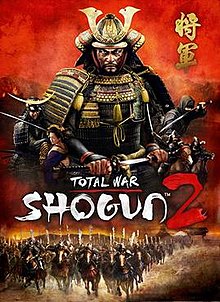| Total War: Shogun 2 | |
|---|---|
 | |
| Developer(s) | Creative Assembly |
| Publisher(s) | Sega |
| Director(s) | Mike Simpson |
| Producer(s) | Ross Manton |
| Designer(s) | James Russell Jamie Ferguson |
| Programmer(s) | Richard Broadhurst Charlie Dell |
| Artist(s) | Kevin McDowell Joss Adley |
| Writer(s) | Mike Brunton Dion Lay Kate Watson |
| Composer(s) | Jeff van Dyck |
| Series | Total War |
| Platform(s) | Microsoft Windows macOS Linux |
| Release | Microsoft Windows 15 March 2011 macOS 31 July 2014 Linux 23 May 2017 |
| Genre(s) | Turn-based strategy, real-time tactics |
| Mode(s) | Single-player, multiplayer |
Total War: Shogun 2 is a strategy video game developed by Creative Assembly and published by Sega in 2011. It is the seventh mainline entry in the Total War series and returns to the setting of the first Total War game, Shogun: Total War, after a series of games set mainly in Europe and the Middle East.
As with the original game, Shogun 2 is set in 16th-century feudal Japan, during a period known as the Sengoku Jidai (Warring States period), where the ruling Ashikaga shogunate has lost its authority over the regional warlords (daimyō) and their clans, who now fight amongst themselves for power. The player takes on the management of one of these clans, with the goal of defeating rival clans and ultimately establishing their rule over Japan as the new Shogun. The standard edition of the game features a total of eight factions (plus a ninth faction for the tutorial), each with a unique starting position and different political and military strengths. The limited edition includes an exclusive ninja clan, the Hattori, and a DLC unlocks a tenth clan, the Ikko-Ikki.[1][2]
The game moves away from the European setting of previous Total War games and returns to the first setting in the Total War series, but making significant changes to core gameplay elements of Shogun 2. Compared to Empire which spanned almost the entire globe, the new installment focuses only on the islands of Japan (excluding Hokkaido) and on a reduced number of unit types.[1]
Shogun 2 received critical praise from reviewers, including for its simplification and refinement of the series by returning to its roots. A standalone expansion, Total War: Shogun 2: Fall of the Samurai, which depicts the 19th-century Boshin War, was released in 2012.
- ^ a b Steve Butts (2 June 2010). "Shogun 2: Total War First Look". IGN. Archived from the original on 5 June 2010. Retrieved 6 January 2011.
- ^ Graham Smith (23 June 2010). "Shogun 2: Total War preview – The master returns". PC Gamer. Retrieved 6 January 2011.